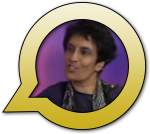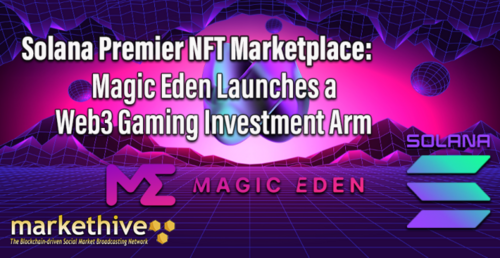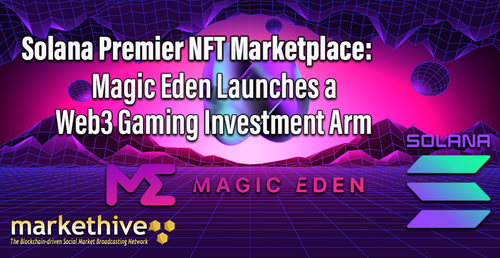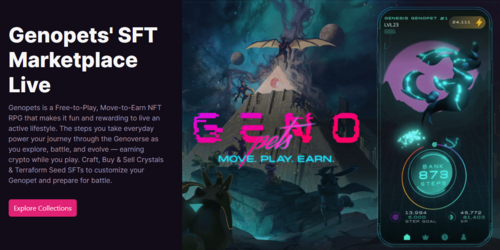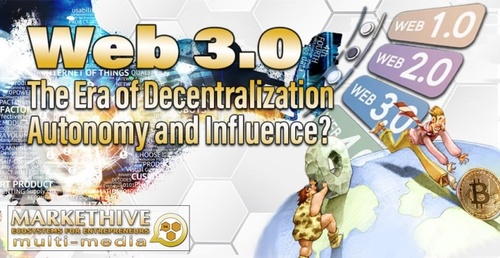
Web 3.0 – The Era of Decentralization, Autonomy and Influence?
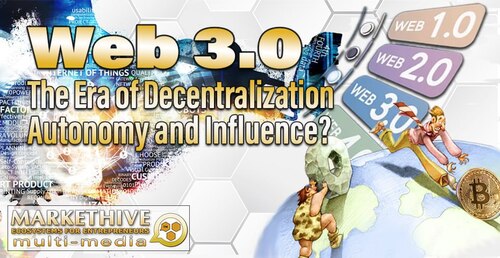
The Evolution of The Internet
In simple terms Web 3.0 refers to a third major iteration of the world wide web or internet as we know it, and in many ways it is still unfolding. But what is it and what does this mean for the individual and entrepreneur? To give proper context to its evolution let’s loop back and take a look at Web version one and two.
Web 1.0
Web 1.0 saw the inception of the world wide web which emerged in 1989 out of the shadows of Arpanet and Milnet, via the innovative influence of Tim- Berners Lee. You could connect to the internet, browse websites and access information in either ‘read only’ format, or downloadable format in many cases. It was a start of a proliferation of information, yet quite passive and static in nature.
Web 2.0
2004 saw an iteration of the internet, which Tim O’Reily supposedly coined. Web 2.0 saw a more interactive version of the internet whereby users could create content, meaning two way engagement.
The main shift was a relational one rather than a technical one per se. More web applications emerged and this is where big tech companies such as social media giants, Facebook and Google took center stage.
YouTube arose, Wikipedia and wikileaks also emerged with editable functions as new information replaced old information. Website architecture such as WordPress came into being, with its drag and drop features, making it simple to create websites without needing to know code in detail. Communication was more interactive and applications such as direct messaging apps increased connectivity. For many it became the prime choice for communication over email.
Web 3.0
If Web 2.0 was all about interactivity, collaboration and engagement, Web 3.0 marks an even greater shift, and it seems to have emerged off the back of the last recession in 2008.
Web 3.0 is more than just an iteration, and is still unfolding. It denotes a major structural shift toward the decentralization of money and data. Most importantly It seems to be heralding an age beyond information to one of autonomy and influence.
Concepts like the blockchain, cryptocurrency, DeFi, Smart Contracts, DAO and NFT are part of the landscape of Web 3.0. Embodied in these concepts are the themes of user control over money, and data, as well the ability to influence their livelihoods and the construction of community projects designed to answer some of the most pressing issues of our times.
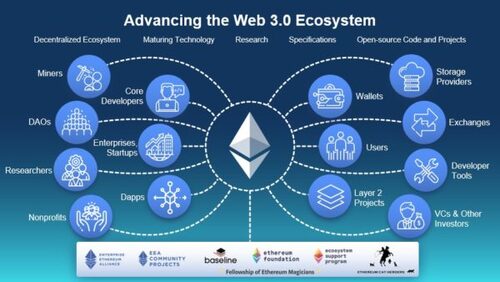
Image source: https://entethalliance.org/advancing-the-web-3-0-ecosystem
It seems like the debacle of the Northern Rock bank run here in the UK back in 2007 has jolted people into realizing that their assets can effectively be stripped in a time of economic slump without their permission. That is grand theft. Are we witnessing a return of power to the people and a leveling of the economic playing field? Time will tell.
What is Decentralization and DEFI?
Decentralization is all about moving the power of influence, control and consumerism away from a central source of control. To make it easier to understand, think of AirBNB and Uber.
AirBNB is an example of the decentralization of vacation accommodation, and the removal of huge overhead costs. It came to prominence in 2008. AirBNB is like a brokerage for homeowners across the globe, who choose to rent their homes out for vacation stays. It offers an attractive alternative experience to the traditional hotel stays.
At around the same time in 2009, Uber saw the decentralization of the transport industry, specifically taxis. In this example Uber acts as a brokerage between vehicle owners and users who need to book transport, as an alternative to the traditional taxi firms. Both are like consumer to consumer models of approach, providing more income opportunities for consumers minus a broker commission in the process.
DeFi stands for decentralized finance. It's all about the decentralization of money into the hands of the community and consumer. Related to that is that, not only does it give control of money and financial data back to the consumer, but the power to influence and contribute to the building of new community structures, according to their white papers.
Cryptocurrency
Cryptocurrency represents digital currency and is to be distinguished from CBDCs, which are digital currencies which are under central bank ownership. Whereas In a bank run such as the Northern Rock event of 2007 you can be denied access to your money, the opposite is true with cryptocurrency.
In 2009 the largest cryptocurrency to date, Bitcoin came into being. Now you can own and control bitcoin through your private wallet, and not be denied access unless you lose your private security keys. You can send bitcoin peer to peer from wallet to wallet, and buy more everyday items via debit cards as mass adoption increases.
Over 10,000 cryptocurrencies have spawned the exchanges since bitcoin took stage, and you can see their status and key metrics in places like nomics and coinmarketcap. Not all coins and tokens are equal, and not all fare well for a variety of reasons.
Many are seen as dud tokens or coins, here today and gone tomorrow. So due diligence is also important if you are looking to build any sort of digital portfolio. In all cases, for transactions to take place it needs an underpinning structure. Enter the blockchain.
Blockchain

Image Source: https://www.simon-kucher.com/en/blog/blockchain-and-its-impact-business-success
An important aspect of the decentralization of money and transactions is something called the Blockchain. This is like a huge digital ledger which is publicly available for all to see, use and verify transactions. This is where you see the description, ‘trustless’, which is the ability to verify without needing trust.
Its transparency and verification features mark a huge development in the area of money. Whenever you buy cryptocurrency at an exchange, and send money peer to peer from your digital wallet all transactions can be tracked on the blockchain. Speed of transaction and fees vary from blockchain to blockchain. Bitcoin transactions can be viewed on the bitcoin blockchain.
Ethereum came into being as a blockchain in 2013 and also has its own token. One of its unique aspects is the ability for a developer to build applications such as smart contracts on its blockchain.
This is basically an executable piece of code that gets activated when the criteria of that contract is met. It effectively takes out the middleman and removes lag time often seen in the manual process of bank or legal contracts, for example. The removal of a lot of bureaucracy may be eliminated in the future with SMART contracts.
Technological advances means that a developer can build their own blockchain as well if they have the technical expertise. You can put your website on the blockchain too. The possibilities are endless with the blockchain infrastructure.
The recent proliferation of DAOs and NFTs and Artificial Intelligence are further signs of a new way of relating to technological advances which puts more autonomy and control in the hands of the user. NFT stands for non fungible tokens, meaning each token cannot be duplicated, and are being used in a number of ways in business. The advert from Budweiser at the recent Superbowl is an example of this. DAO stands for Decentralized Autonomous Organization which involves voting and co- ownership of that particular community project. It gives more say and influence to its participants.
Artificial Intelligence is streamlining and compressing a lot of manual activities, which has implications for productivity and innovation. Of course, with autonomy comes the need for greater responsibility and wisdom where technology is concerned and this applies to life in general. The more power you have, the more responsibility and wisdom is implied.
Is Web 3.0 and DeFi here to stay? The volatile nature of cryptocurrency makes it difficult to make a statement one way or the other. Also the various governmental regulations touted add to that uncertainty, such as ISO 20022. Some predict that with the new ISO 20022 standard most cryptocurrencies will be wiped out.
What is ISO 20022?
To keep it simple ISO 20022 is an algorithmic standard, a bit like SWIFT in the banking structures, which validates financial transactions and data across the globe. It is the proposed shift from SWIFT to ISO 20022 that has caused concern about the future of cryptocurrency because only a handful of cryptocurrencies are compliant with this standard.
Ripple, Algorand, Stellar Lumens, Iota, XinFin, Hedera and Quant are the confirmed ones. Regulations in general can be a double edged sword as Ripple [ XRP ] found out, even with its ISO 20022 status, as it does battle with the Securities Exchange Commission.
Summary
Whilst the volatility of cryptocurrencies makes its course less predictable, and regulations such as ISO 20022 and SEC may throw a spanner in the works, there are a lot of moving factors beyond this that can support or derail a cryptocurrency.
Standards of good practice are essential. Yet many see regulations as a kickback from central authorities who do not wish to lose their power and status over the people, hence giving crypto users a hard time in terms of operating freely.
What is clear is that people are fed up of the old erroneous, incompetent and corrupted structures. Bitcoin continues to lead the way in gathering pace in mass adoption in the arena of supply and demand. Markethive is also an example of an ecosystem which is navigating the obstacles through its credits system.
The regulators may view bitcoin as a commodity but the issuance of debit cards to translate bitcoin into spendable money for everyday items suggests a more powerful use value.
Expenditure in relation to supply and demand may be a more predictive indicator. Billions are being poured into blockchain solutions, and businesses are expected to increase expenditure into blockchain technology significantly, suggesting that blockchain will be a central part of business moving forward.
.png)
Image Source: https://www.digitalinformationworld.com/2021/10/this-infographic-illustrates-10-biggest.html
Web 3.0 is continuing to be shaped by these new structures and concepts of decentralized finance, which means more autonomy and responsibility for the user and entrepreneur. Like AirBNB and Uber it seems to be part of a wider trend that is here to stay as it looks to shape a new economy.
Now more than ever the opportunity exists for the entrepreneur to shape the destiny of their business with enabling technology. If privacy, autonomy and freedom of speech are important to you then you now have the possibility to move your website to the blockchain.
The shackles of constraint can come off your mind as you seek to evaluate how your business can benefit you and your audience with these new possibilities. I look forward to establishing my website on the blockchain for peace of mind. That’s just for starters.
If it all feels new and overwhelming, know that there are academies and education hubs like Bankless and Moralis Academy that are designed to walk you through and empower you with the necessary education to enable your business to operate with greater autonomy and influence as a force for good.
.jpg)
